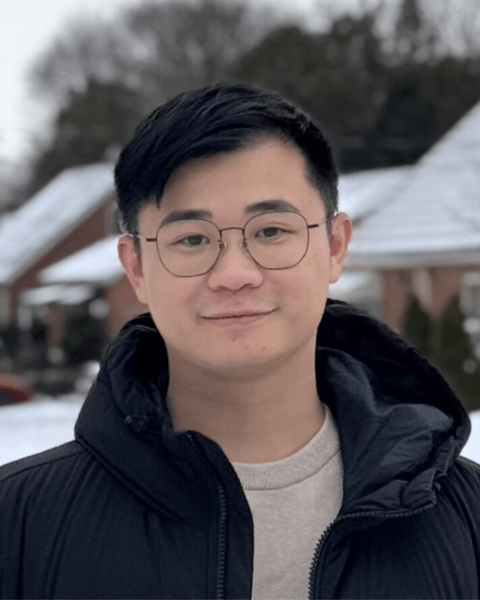The Postdoc Experience Profiles project is a collection of stories from postdocs discussing their experiences at the Waterloo.
Everything from moving to Canada, to teaching, to lessons learned, and advice with other current and prospective postdocs. Read the profiles below to learn from the experiences of other Waterloo postdocs.
We also want to hear from you! Every postdoc at the University of Waterloo is an accomplished academic working at the forefront of their respective fields and has experienced challenges and accomplishments that we want to share. Fill out our share your postdoc experience with us web form to engage in this opportunity to share about yourself and your advice for your peers.
Hossein Mashhadimoslem
Hossein is a postdoctoral scholar in the Department of Chemical Engineering, where he researches materials discovery using artificial intelligence (AI) and the design of adsorbents, catalysts, and battery materials.
"Establish discipline in your schedule and work hard to establish good academic and industrial connections as those will be essential for future research."
Thomas Kwok
Thomas is a postdoctoral scholar in the Active and Interactive Robotics Lab in the Faculty of Engineering.
“My advice is to choose a supervisor and research team who are genuinely supportive, not only of your research but also of your well-being and career development. A positive and encouraging environment can make a huge difference in navigating the challenges of postdoc life and adjusting to a new country.”
Ahmad Aminzadeh
Ahmad is a postdoctoral fellow in the Department of Mechanical and Mechatronics Engineering, and beyond his academic research, Ahmad is an active member of the Canadian Welding Bureau (CWB) and serves on the Canadian Council of the International Institute of Welding (CCIIW).
“Waterloo offers a rare ecosystem where cutting-edge research and industrial application meet seamlessly."
Wenyu Gao
Wenyu is a postdoctoral scholar in the Department of Chemistry, where she works in Waterloo Advanced Technology Laboratory (WATLab) researching nanogap device fabrication.
"As disciplines become more interdisciplinary, my knowledge is expanding, allowing me to connect previous knowledge to my current research. Every step counts”.
Lauren Straatman
Lauren is a postdoctoral scholar in the Department of Kinesiology and Health Sciences at the University of Waterloo, where she works in the Mobilize Clinical Biomechanics Lab researching knee osteoarthritis (OA) and the impact of a variety of structural and illness factors in knee OA progression and severity.
“If there’s one thing I learned, it’s that you shouldn’t be afraid to ask for help. I tried to figure everything out on my own because I assumed asking for help would show a weakness. I couldn’t have been more wrong."
Sonia Jaberi
Sonia Jaberi, a postdoctoral fellow in Civil and Environmental Engineering at the University of Waterloo, researches water resources while navigating the transition from graduate student to independent scholar. She emphasizes building confidence, seeking guidance, and setting clear expectations as keys to thriving in the postdoc journey.
Shahabeddin Abhari

Shahabeddin received his Bachelor’s degree in Health Information Technology (HIT) in 2013 from Shiraz University of Medical Sciences in Iran. He then went on to obtain a Master of Science in HIT, a Master of Public Health in Health Policy, and a Master of Business Administration at Shahid Beheshti University of Medical Sciences before completing his PhD in HIT from Tehran University of Medical Sciences. Following his PhD, Shahabeddin worked at Mazandaran University of Medical Sciences in Iran as an Assistant Professor for three years, gaining experience in the education and research field before starting his postdoc appointment at Waterloo.
“Stay committed and resilient on your journey and remember that persistence and perseverance are often key ingredients to success."
Alaaeldin Ahmed

Alaaeldin Elhady Ahmed completed his PhD in Systems Design Engineering at the University of Waterloo. Following his PhD, Alaaeldin started a postdoctoral appointment in September 2021.
As a PhD graduate, Alaaeldin is aware that he is very specialized, but that this can mean there are gaps is some practical skills. He says, “the best course of action is to try to fill the gaps by taking online courses and hands-on training”.
Ana Ines Ennis

Ana Inés Ennis completed her undergraduate and PhD education at Universidad Nacional de La Plata in Buenos Aires, Argentina, where she was born. In 2022, Ana came to Canada to begin her postdoctoral appointment at the University of Waterloo through the Centre for Astrophysics and Perimeter Institute.
Ana highly recommends attending events as she found connecting with other postdocs outside her field has been helpful for her mental health, sharing that "people are always willing to help if you reach out."
Anirban Banerjee

Anirban Banerjee obtained his Bachelors degree in Biotechnology from the Heritage Institute of Technologyin Kolkata, India. After arriving in Canada, he completed a Master of Science degree in Microbiology and Immunology at the University of Saskatchewan, followed by a PhD in Biology at the University of Western Ontario. He has held two appointments as a postdoctoral fellow in the Department of Chemical Engineering at the University of Waterloo.
While the University of Waterloo is the first place that Anirban got to be a lecturer, but he has always wanted to be a teacher. “Illuminating fresh minds is what I enjoy doing. Explaining concepts from scratch and taking the effort to deliver complex ideas in a simple way is what I love.”





